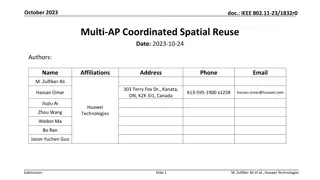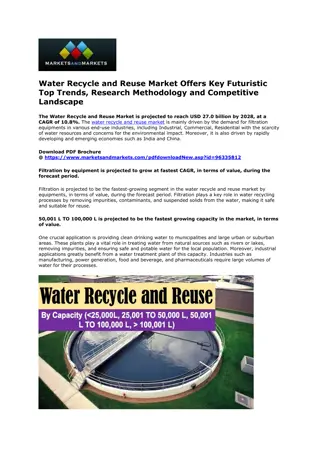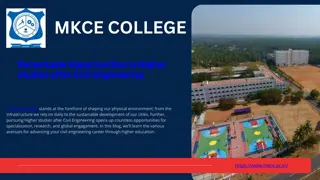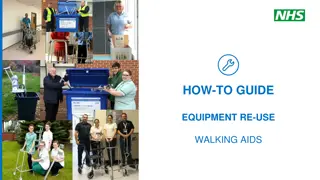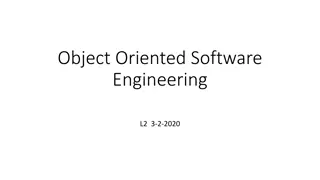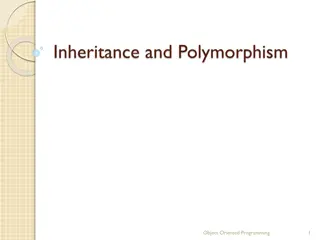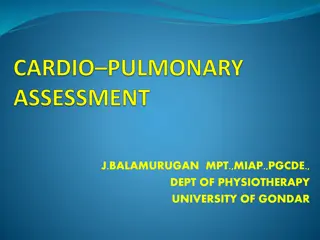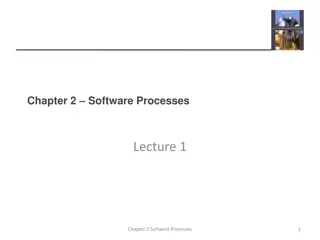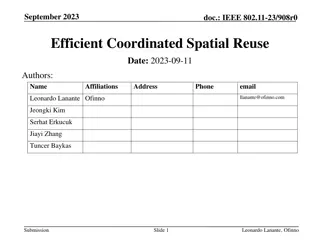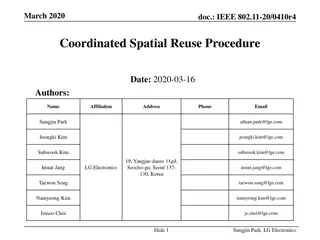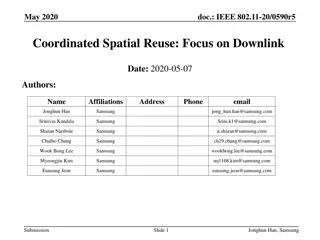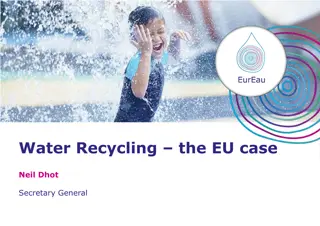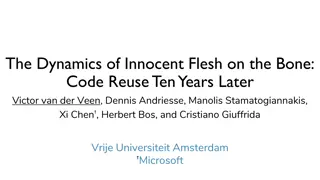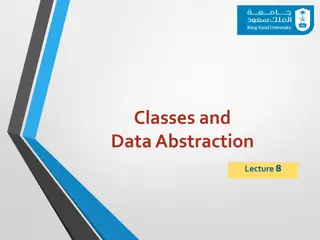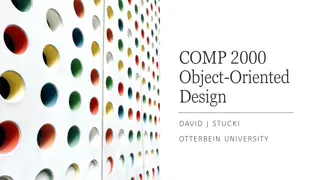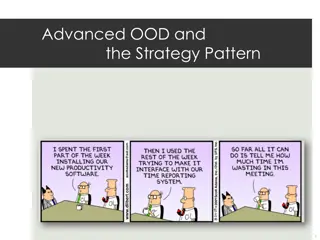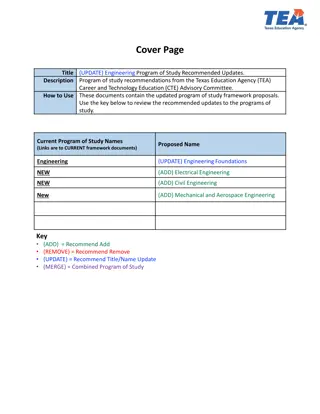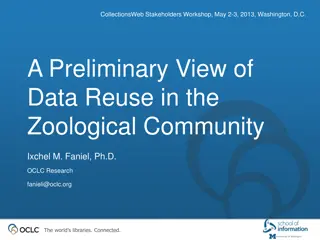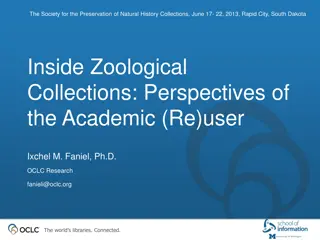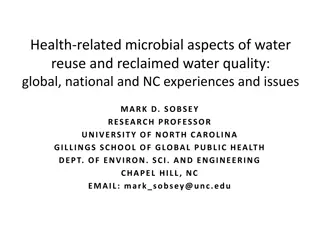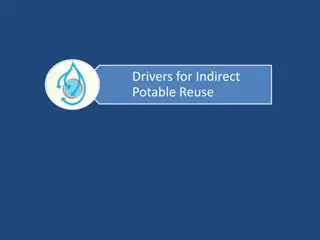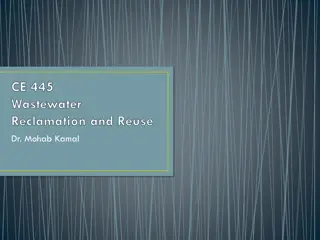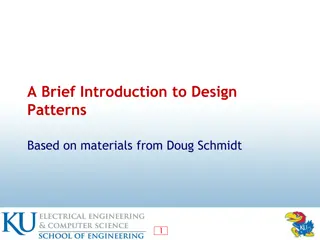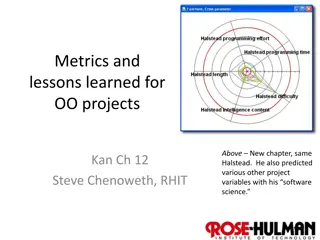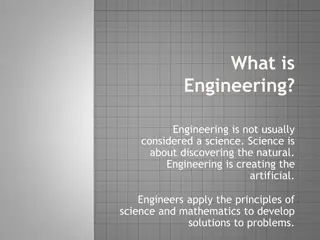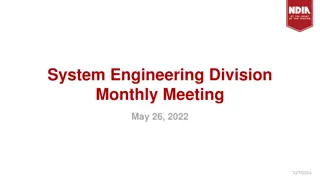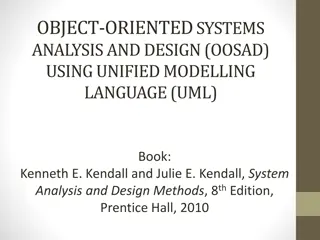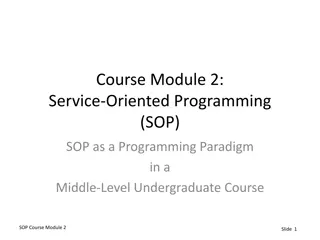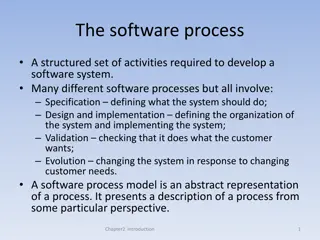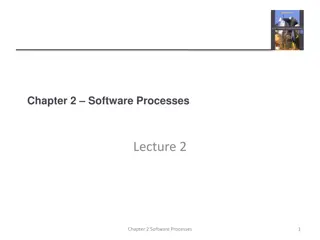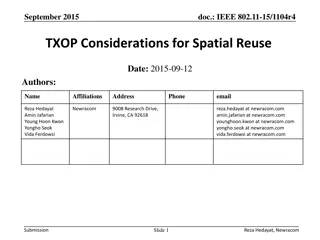Coordinated Spatial Reuse
Explore the concept of Coordinated Spatial Reuse (C-SR) in IEEE 802.11 networks, a scheme where multiple access points (APs) transmit data simultaneously to reduce interference and enhance resource utilization. Learn about the definition, benefits, and necessary components for successful C-SR operat
0 views • 15 slides
Urban Mining and CDW Circular Economy Cost-Benefit Analysis
This case study focuses on comparing the cost and greenhouse gas emissions savings of local processing and reuse of Construction and Demolition Waste (CDW) materials versus sending them to landfills. By developing a prototype cost and GHG savings calculator, the aim is to showcase the potential of e
0 views • 14 slides
Coordinated Spatial Reuse in IEEE 802.11bn Standard
This contribution explores Coordinated Spatial Reuse (Co-SR) as a potential multi-AP feature for the IEEE 802.11bn standard. It discusses the trade-offs, proposes a method for downlink channel access, and evaluates its impact on goodput and packet delivery delay. The background highlights the gains
1 views • 17 slides
Analysis of Power Control for Coordinated Spatial Reuse in IEEE 802.11-24
Evaluation of power control schemes for Coordinated Spatial Reuse (CSR) in IEEE 802.11-24, comparing benefits with and without power control. Results show gains in throughput and SINR with different CSR schemes and considerations for shared access points. Concerns and insights shared on the effectiv
6 views • 24 slides
Sustainable Solutions: Exploring the Water Recycle and Reuse Market
The water recycle and reuse market is projected to reach USD 27.0 billion by 2028, at a CAGR of 10.8% from USD 16.1 billion in 2023. The market growth is driven by factors such as the use of equipments like filtration, Machinery and the increasing demand for the use of water recyle due to the limite
0 views • 5 slides
Remarkable Opportunities in Higher studies after Civil Engineering
Higher studies after Civil Engineering in Tamil Nadu\nCivil engineering stands at the forefront of shaping our physical environment; from the infrastructure we rely on daily to the sustainable development of our cities. Further, pursuing Higher studies after Civil Engineering opens up countless oppo
0 views • 2 slides
Reusing Walking Aids for a Greener NHS
Reusing walking aids like crutches, frames, and walking sticks can significantly reduce carbon emissions and waste in the healthcare sector. By implementing walking aid reuse schemes, hospitals can save money, reduce their environmental impact, and contribute to the NHS's sustainability goals. This
0 views • 18 slides
Understanding Object-Oriented Software Engineering Principles
Explore the concepts of inheritance, generalization/specialization, UML representation, object/class relationships, multiplicity notations, and aggregation in object-oriented software engineering. Learn how methods and attributes can be inherited, grouped, and reused among classes, and understand th
0 views • 30 slides
Understanding Inheritance and Polymorphism in Object-Oriented Programming
Inheritance in object-oriented programming allows the creation of new classes derived from existing classes, promoting code reuse. By extending a general superclass to specialized subclasses, developers can model different entities efficiently. However, it's crucial to understand when to use inherit
1 views • 61 slides
Comprehensive Overview of Problem-Oriented Medical System in Physiotherapy Assessment
In the realm of physiotherapy assessment, the Problem-Oriented Medical System (POMS) plays a vital role in accurately defining patient problems, creating treatment plans, and monitoring progress. This system, pioneered by Weed in 1968, consists of Problem-Oriented Medical Records (POMR), auditing, a
2 views • 34 slides
Issues and Algorithms in Server Software Design
The content discusses fundamental issues in server software design such as connectionless vs. connection-oriented access, stateless vs. stateful applications, and iterative vs. concurrent server implementations. Various server algorithms like iterative and concurrent servers are explained with their
3 views • 44 slides
Overview of RESTful Web Services and Service-Oriented Architecture
This content provides insights into RESTful Web Services, Service-Oriented Architecture (SOA), Traditional Web Services, Overcomplication in system design, and Resource-Oriented Architecture. It discusses key concepts, technologies, and standards involved in these architectures, along with details o
2 views • 18 slides
Understanding Software Processes and Models
Software processes are structured activities essential for software system development, involving specification, design, validation, and evolution. Various process models and approaches like the Rational Unified Process and agile methods are discussed, highlighting the importance of adaptability in
2 views • 105 slides
Efficient Coordinated Spatial Reuse in IEEE 802.11-23
Coordinated Spatial Reuse (C-SR) is a Multi-AP transmission technique proposed for UHR networks that enhances efficiency by utilizing RSSI or pathloss feedback instead of complete CSI. This document introduces an efficient protocol for C-SR, focusing on a unified approach for better implementation.
0 views • 10 slides
Understanding IEEE 802.11-20/0410r4 Coordinated Spatial Reuse Procedure
This document presents the Coordinated Spatial Reuse (CSR) procedure in IEEE 802.11-20/0410r4, focusing on the transmission schemes and necessary information for effective spatial reuse. It outlines the topology of CSR environments, acquisition of information for CSR, CSR capability announcement by
8 views • 23 slides
Mastering Pricing Strategies in Marketing
Explore the psychology of pricing and various pricing strategies in marketing, including profit-oriented, competitor-oriented, and customer-oriented pricing. Learn about the importance of understanding how customers view prices, leveraging pricing anchoring, and conducting Van Westendorp Price Sensi
3 views • 26 slides
Coordinated Spatial Reuse in IEEE 802.11 Networks
The document discusses Coordinated Spatial Reuse (C-SR) in IEEE 802.11 networks, focusing on downlink transmission. C-SR is a multi-AP coordination scheme aimed at enhancing spectrum efficiency by reusing time/frequency resources among multiple Basic Service Sets (BSSs). The procedure is divided int
1 views • 24 slides
Water Recycling in the EU - Addressing Challenges and Benefits
Water recycling in the EU is gaining traction due to the increasing pressure on water resources. Recovered water treated to safe standards has economic and environmental benefits. Despite challenges like costs, it has potential for applications in agriculture and industry. EurEau, representing water
0 views • 13 slides
Code Reuse Ten Years Later: A Study on Gadget Finding
This study by Victor van der Veen and team from Vrije Universiteit Amsterdam, along with Xi Chen from Microsoft, delves into the dynamics of innocent flesh on the bone in the context of code reuse. The researchers focus on gadget finding and provide valuable insights through their analysis.
0 views • 94 slides
Understanding Classes and Data Abstraction in Object-Oriented Programming
Object-oriented programming (OOP) encapsulates data and functions into classes, akin to blueprints for creating objects. This lecture delves into the relationship between classes, objects, data members, member functions, and user-defined types. It emphasizes the reuse and encapsulation of code, info
5 views • 22 slides
Understanding Object-Oriented Design Principles
Explore the core concepts of object-oriented design, including objects, classes, and the object-oriented paradigm. Learn about the relationship between objects and classes, and how they form the building blocks of software development. Gain insights into class components, attributes, and methods, an
0 views • 18 slides
Understanding Object-Oriented Programming (OOP) in Python
Object-Oriented Programming (OOP) is a programming paradigm that focuses on organizing code into objects with attributes and behaviors. Python supports various OOP concepts such as classes, objects, inheritance, polymorphism, abstraction, and encapsulation. Classes serve as blueprints for creating o
0 views • 29 slides
Understanding Advanced Object-Oriented Design and the Strategy Pattern
Delve into the intricate world of Object-Oriented Design (OOD) with a focus on the Strategy Pattern. Explore the fundamental principles of OOD, such as encapsulation, abstraction, and the Single Responsibility Principle. Discover how objects interact through messages and how to ensure each class has
0 views • 22 slides
Recommended Updates for Engineering Program of Study
The Engineering Program of Study recommendations from the Texas Education Agency (TEA) Career and Technology Education (CTE) Advisory Committee include updates to various fields such as Electrical Engineering, Civil Engineering, and Mechanical and Aerospace Engineering. The proposed program framewor
0 views • 5 slides
Exploring Data Reuse in the Zoological Community
Preliminary findings from a project funded by the Institute for Museum and Library Services led by Drs. Ixchel Faniel and Elizabeth Yakel delve into the intersection of data reuse and digital preservation in quantitative social science, archaeology, and zoology. The research focuses on identifying t
0 views • 12 slides
Digital Preservation in Academic Research Data Reuse
The Society for the Preservation of Natural History Collections conducted a project funded by IMLS to study data reuse and digital preservation in academic disciplines. The research team explored significant properties of social science, archaeological, and zoological data for effective preservation
0 views • 14 slides
Understanding Health Risks in Reclaimed Water and Water Reuse
Exploring the microbial aspects of reclaimed water and wastewater reuse is crucial for public health. Pathogenic microorganisms present in wastewater, such as bacteria, viruses, and parasites, can lead to gastrointestinal and systemic illnesses in humans. Proper removal and inactivation of these pat
0 views • 25 slides
Strategies for Sustainable Water Management
Drivers for indirect potable reuse include water stress, population growth, industrial development, droughts, and climate change. Other drivers for water reuse encompass conservation, environmental enhancement, pollution abatement, and regulatory policies. Rising water rates and costs of imported wa
0 views • 21 slides
Design Principles for Water Reclamation and Reuse
Achieving consistent reclaimed water quality requires proper treatment strategies, technical controls, online monitoring, and operational controls. The design principles focus on elements like monitoring, attenuation, retention, and blending to ensure water quality for various reuse applications. Wa
0 views • 22 slides
Understanding Design Patterns in Object-Oriented Design
Design patterns in object-oriented design (OOD) are essential templates that codify best practices for solving common problems. They help streamline development by capturing proven design decisions, promoting code reuse, and enhancing system flexibility and modularity. Learn about the core concepts,
0 views • 20 slides
Metrics and Lessons Learned for Object-Oriented Projects
This chapter discusses various metrics and lessons learned for object-oriented projects, including the use of major OO metrics, Lorenz's metrics, IBM's Object Oriented Technology Council recommendations, and the CK metrics suite. The CK metrics suite covers six OO design and complexity measures, suc
0 views • 17 slides
Exploring Computer Programming Principles
Dive into the world of computer programming, covering high-level and machine languages, compilers, interpreters, writing programs, top-down design, and the array of programming languages available. Understand the essentials of building code to control computers, the diversity of programming language
0 views • 23 slides
Exploring the World of Engineering: Types and Applications
Engineering is a creative process that involves applying scientific and mathematical principles to develop solutions. This article delves into the different branches of engineering - Chemical, Civil, Electrical, and Mechanical - showcasing the diverse applications of each field. From discovering pla
0 views • 12 slides
System Engineering Division Monthly Meeting Summary - May 26, 2022
The System Engineering Division Monthly Meeting on May 26, 2022, featured discussions on USD Research & Engineering, Mission Engineering Initiatives, Digital Systems Engineering, Committee Reports, and Updates. Presenters included key figures such as Holly Dunlap, Marc Goldenberg, Dr. Judith Dahmann
0 views • 51 slides
Understanding Inheritance and Polymorphism in Object-Oriented Programming
Inheritance allows classes to form hierarchical relationships, facilitating code sharing and reuse. Superclasses are extended by subclasses, which inherit their behavior. This relationship creates an "is-a" connection, such as Tiger extending Cat. Polymorphism, demonstrated through a set of classes
0 views • 11 slides
Object-Oriented Systems Analysis and Design (OOSAD) Using Unified Modeling Language (UML)
Explore the fundamentals of object-oriented analysis and design using UML, a powerful tool for constructing and visualizing systems. Learn about object-oriented concepts, classes, inheritance, UML diagrams, use case modeling, activity and sequence diagrams, and more. Discover how UML can enhance the
0 views • 144 slides
Understanding Service-Oriented Programming in Middle-Level Courses
Service-Oriented Programming (SOP) is a new programming paradigm focusing on using services to design and develop integrated business applications. This module covers the importance of SOP in current application development, fundamental concepts of web services, standards underlying service-oriented
0 views • 22 slides
Understanding Software Process Models
Software process models encompass various activities like specification, design, validation, and evolution involved in developing a software system. This includes plan-driven and agile processes, as well as models like the waterfall model and reuse-oriented software engineering. Embracing elements f
0 views • 7 slides
Software Development Processes and Challenges
Incremental development offers benefits such as reduced costs, faster feedback, and more rapid delivery. However, challenges like visibility issues and system structure degradation can arise. Reuse-oriented software engineering focuses on systematic reuse for building business systems. Different typ
0 views • 10 slides
IEEE 802.11-15/1104r4: Optimizing CCA Threshold for Spatial Reuse in WLANs
The document discusses considerations for optimizing the Clear Channel Assessment (CCA) threshold in wireless local area networks (WLANs) to enhance spatial reuse efficiency. It emphasizes minimizing over-protection caused by the current CCA rule while addressing factors like frequency reuse, BSS/OB
0 views • 18 slides


